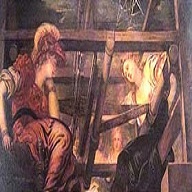Arachne
There are three versions of this story, one in which Arachne loses and two in which she wins although is turned into an arachnid anyway for her insolence.
Ovid's version
One version appears in the Metamorphoses of the Roman poet Ovid.
In this version, Arachne was a shepherd's daughter who began weaving at an early age. She became a great weaver, boasted that her skill was greater than that of Athena, and refused to acknowledge that her skill came, in part at least, from the goddess. Athena took offense and set up a contest between them.
Presenting herself as an old lady, she approached the boasting girl and warned: "You can never compare to any of the gods. Plead for forgiveness and Athena might spare your soul".
"Ha, I only speak the truth and if Athena thinks otherwise then let her come down and challenge me herself," Arachne replied. Athena removed her disguise and appeared in shimmering glory, clad in a sparkling white chiton. The two began weaving straight away.
Athena's weaving represented four separate contests between mortals and the gods in which the gods punished mortals for setting themselves as equals of the gods. Arachne's weaving depicted ways that the gods had misled and abused mortals, particularly Zeus, tricking and seducing many women. When Athena saw that Arachne had not only insulted the gods, but done so with a work far more beautiful than Athena's own, she was enraged.
She ripped Arachne's work into shreds, and sprinkled her with Hecate's potion, turning her into a spider and cursing her and her descendants to weave for all time. This showed how goddesses punished those human for wanting to be equals.
Athena wins
In this version, someone asked Arachne how she learned to weave so well and suggested that Athena taught her and she didn't know it. Arachne dismissed this and boasted that she could teach Athena a thing or two in weaving. Athena then appeared in the doorway, wrapped in a long cloak, and asked if she really didn't believe that Athena had taught her to weave.
Arachne repeated her boast and Athena challenged her to a contest in which Jupiter (Zeus) was to be the judge. Whoever lost must promise never to touch spindle or loom again. Arachne wove a web thin yet strong with many colours. This was no match for Athena's weaving, made up of the gods and their glory, shining with their beauty.
Arachne acknowledged Athena's triumph, but despaired at the loss of her craft. Athena saw that Arachne could not live if she could not weave, so she touched Arachne with the tip of her spear, turning her into a spider so she could weave without spindle or loom.
Arachne wins but hangs herself
In this version of the myth, Arachne was a blessed weaver of Greece. People asked her if she had been taught weaving by Athena herself, the goddess of wisdom. Although this was meant as a compliment, Arachne became angry. She thought that her skill was greater than the goddess's. Hearing of her attitude, Athena appeared on her doorway disguised as an old woman in a dark cloak. She asked her to respect the gods and goddesses, but Arachne just laughed, and said that even if Athena herself challenged her, it would be an easy win.
Athena then revealed herself and challenged Arachne to a competition. The loser would promise never to weave again.
Athena wove a tapestry of the people of Greece, with Poseidon and Athena over them, deciding whose name should be given to the city of Athens. Arachne wove a tapestry about Zeus, and his seduction of Europa and others. Athena saw that although Arachne had insulted the gods, her work was so beautiful that Athena herself was awed.
She realized that Arachne couldn't live without weaving. To make Arachne realize her mistake and also to teach her to respect the gods and their works, she touched Arachne's forehead with the tip of her hand. The magic worked only partially, filling Arachne with guilt for her insolence, and she hung herself. Out of pity, Athena brought Arachne back to life as a spider, so that she and her descendants could weave all their lives.













